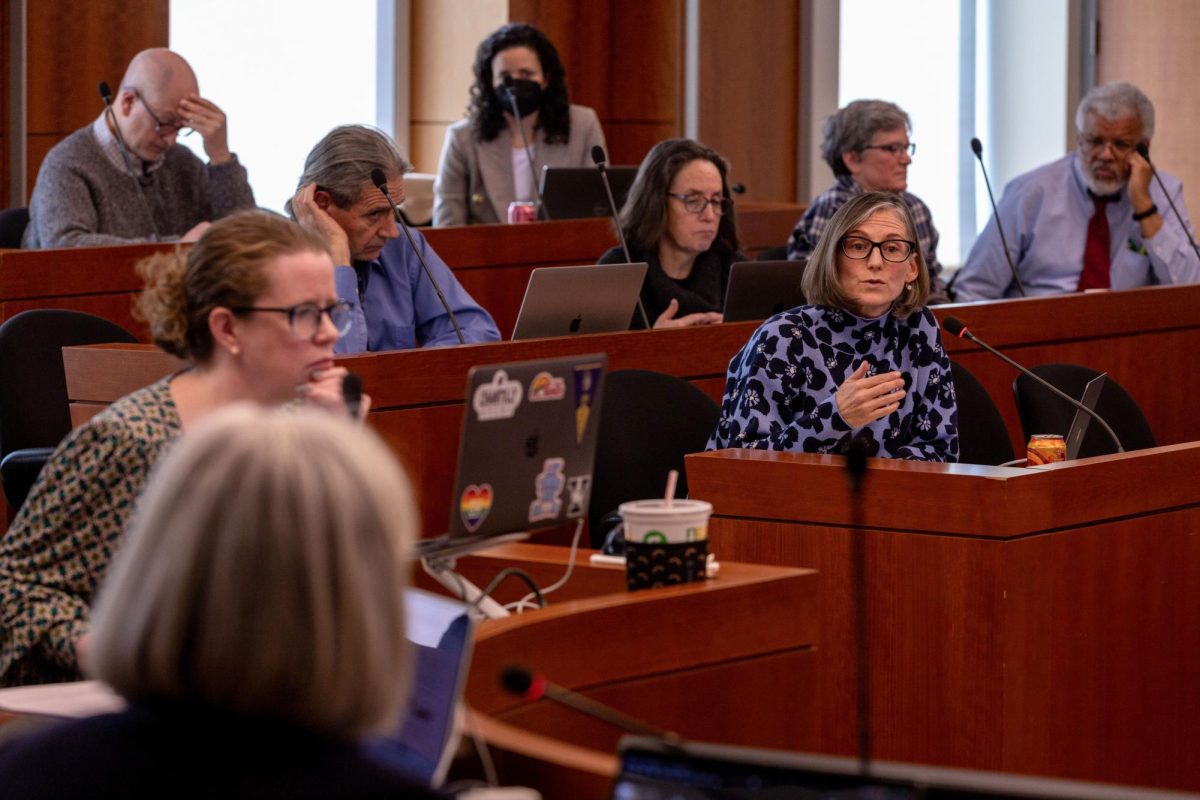Chief Financial Officer Bruno Fernandes delivered a report on the financial status of the Medical Faculty Associates on Friday amid debates over the medical arm debt’s potential harm to the GW student experience.
Fernandes delivered the report to the Faculty Senate in a closed-door session after senators voted to remove it from the public portion of the meeting due to its “sensitive nature.” Senators also passed a resolution that asks the Board of Trustees to evaluate the financial losses of the MFA — a group of physicians and faculty from the School of Medicine and Health Science and GW Hospital — and their potential effect on GW’s “underfunded areas.”
Officials released the Q1 numbers of the MFA publicly as an addendum to the senate meeting agenda in December, which revealed that the organization lost $27 million in the first quarter of fiscal year 2024.
The MFA, which owes GW $200 million, has lost $80 million in the last two fiscal years and is expected to lose another $30 million to $50 million by the end of FY 2024. The mounting debt has been a point of continual contention between senators and administration, and the resolution marks the second time senators have asked for more transparency on the MFA’s finances after senators requested quarterly updates to the Faculty Senate Executive Committee and the Faculty Senate Fiscal Planning and Budgeting Committee in a January 2023 resolution.
The resolution calls for a report from President Ellen Granberg, Provost Chris Bracey and Fernandes by March 1, 2024 and Feb. 1 of each following year that assesses the impact of the MFA’s financial state on the University. Fernandes said in October that he did not expect the MFA to break even by the end of FY 2024, a reversal from previous predictions that the MFA would pay back its debt during the fiscal year.
Sarah Wagner, the co-chair of the Educational Policy & Technology Committee, introduced the resolution requesting the Board evaluate the MFA’s debt and its effect on schools like the Columbian College of Arts & Sciences. Wagner said the resolution was not an “attack” on GW’s medical arm but instead based on “concern” for GW’s success.
“We are frustrated by encouraging words of turnarounds that have not materialized and by the uncertain past,” Wagner said. “The path forward in which enduring MFA losses on such a scale may end up jeopardizing GW’s educational mission, student experience and financial aid.”
Katrin Schultheiss, a faculty senator and history professor, said the resolution provides a “structure” to convey the relationship between the MFA and the rest of the University. She said the resolution would clarify how the MFA’s situation relates to other University functions, like the Columbian College of Arts & Sciences’ FY 2024 budget cuts.
“Personally, I’ve heard nothing but rumors about how the MFA is sinking this enterprise and sinking that enterprise,” Schultheiss said. “I think that’s inaccurate, but it’s rooted in not people not knowing. They don’t understand it.”
Barbara Bass, the MFA’s CEO and the dean of the School of Medicine and Health Sciences, said she is disappointed people are unfamiliar with the medical school’s structure, and that she takes the blame in that people are not “enlightened” on its structure. Bass said a clinical faculty practice like the MFA is critical to having a school of medicine.
“I would hope everyone in a university or research-driven university must have clinical faculty of size and scale to meet the educational needs of the students,” Bass said. “The MFA, when it was formed, back at that time when it was separated from the University, was formed in its bylaws to serve exclusively the educational and training needs of the School of Medicine and Health Sciences of George Washington University.”
Bass added that the organization pays back the money that it owes to the University at a rate that “contributes substantially” to the University’s spendable revenue.
“This is an extraordinary, unprecedented time in healthcare,” Bass said. “Where we really went off the tracks was during the pandemic, and we are rigorously finally having the chance to rebuild that.”
After Faculty Senate Executive Committee Chair Ilana Feldman suggested the senate move the discussion on the MFA’s Q2 financial report into executive session, Jennifer Brinkerhoff, a faculty senator and professor of international affairs, asked Feldman about the status of filling in faculty who are not in the senate about the MFA’s finances.
“I’m just a little bit concerned about the movement of the sensitive material into the executive session,” Brinkerhoff said. “A couple of faculty members have reached out to me as a member of the senate expressing concern about this impending move and wondering when the broader faculty and the Faculty Senate get to have better information about what’s happening with the MFA.”
Jonathan Eakle, a faculty senator and professor in the Graduate School of Education and Human Development, passed an amendment to the resolution with an 11-9 vote that labeled graduate programs as underfunded, language that was already applied to undergraduate programs in the resolution.
Tarek El-Ghazawi, a faculty senator and engineering professor, also passed an amendment 17-3 that asked the Board of Trustees and administration to assess the investment needed to “protect and enhance” research at the University.
“Research is another arm in the formula of the whole organization that really needs to be taken into account,” El-Ghazawi said. “Adding that would just bring in research at the same footing with education and everything, including the medical school and everything else.”
Anna Fattizzo, Fiona Riley, Grace Chinowsky, Ianne Salvosa, Rachel Moon and Rory Quealy contributed reporting.





